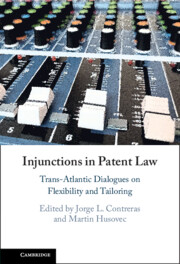We are delighted to present this book. It is the result of a three-year project that was made possible thanks to the generosity and enthusiasm of our authors and other participants in our dialogues.
The project began in 2017. We had each been involved in prior projects that investigated remedies in intellectual property cases on a comparative international basis. Husovec’s monograph Injunctions against Intermediaries in the European Union (Cambridge University Press, 2017) focused on injunctive relief in intellectual property cases against intermediaries, and Contreras covered injunctions in patent cases in contributions to the edited volumes Patent Law Injunctions (Rafał Sikorski, ed., Wolters Kluwer, 2019) and Patent Remedies and Complex Products (C. Bradford Biddle et al., eds., Cambridge University Press, 2019). In comparing notes, however, we realized that scholarship on the comparative aspects of flexibility and tailoring of injunctions under patent law continues to pose many unanswered questions.Footnote 1 Since the issue was growing in importance, we decided to organize a workshop with a number of leading patent law experts from various jurisdictions to consider the scope of the issues.
This first dialogue was held in June 2018 at Tilburg University, Netherlands, and was entitled Mapping Flexibilities for Injunctive Relief in Patent Law: What Can the Member States of the European Union and the United States Learn from Each Other? The discussion included most of the jurisdictions represented in this book, with the exceptions of Finland, Israel and Canada. Each jurisdiction was represented by two experts. One expert was asked to draft a detailed report summarizing the law of injunctions in their jurisdiction, and the second to comment on and validate the findings of that report. In this way, we tried to build solid ground for personal dialogues with the primary goal of deepening common understanding and facilitating the exchange of ideas. This process allowed our Tilburg dialogues to be highly focused, which we hope is also apparent from the contributions in this book.
The participants in the workshop then offered to commit their valuable time to a book project whose goal was to expand the discussion and offer its fruits to a broader readership. To initiate this second phase of the project, we organized a second meeting, this time in beautiful Vienna in conjunction with the annual meeting of the European Law Institute.
To keep the work manageable, we limited our comparative exercise to the transatlantic space only, omitting important jurisdictions in Asia and elsewhere. The book draws its insights from a representative sample of European countries steeped in different legal traditions, the United States, Canada and Israel.Footnote 2
As with any project, we wish some things had worked out differently. The lives of our contributors were deeply impacted by COVID-19, which made the finalization of the project particularly challenging and prevented us from holding a final symposium to discuss and announce our results, which we hope to conduct once the world has returned to a more normal state.
Therefore, we are particularly grateful to eminent patent judges, including Sir Richard Arnold, Dr. Klaus Grabinski and Dr. Peter Block, who shared their views, whether in writing or as participants in one or both of our workshops. We are also grateful to the other participants in our workshops, in particular Colleen Chien, Lisa van Dongen, Florian Schuett, Matěj Myška, Andreas Wiebe, Franz Hofmann, Alain Strowel and Luke McDonagh. We are also grateful for the able assistance of student research assistants Sydney Hecimovich and Matthew Whitehead at the University of Utah, who helped with the preparation of this book.
Last but not least, we wish to acknowledge the financial support of Qualcomm, which funded the organization of the initial Tilburg workshop through the Tilburg Centre for Law and Economics (TILEC), and Intel, which provided funding for the workshop in Vienna, along with open access publication of the book, via the Tilburg Institute for Law, Technology, and Society (TILT). We have contributed all royalties from sales of this book toward making it available on an open access basis to all interested readers. We hope that it will continue to advance the important dialogue on international patent remedies.
1 While the subject of flexibility in injunctive relief has been addressed briefly in prior work, it has not previously been the subject of an in-depth study. See, e.g., Cotter Reference Cotter2013, 247–48; Siebrasse et al. Reference Siebrasse, Sikorski, Contreras, Cotter, Golden, Jong, Love, Taylor, Biddle, Contreras, Love and Siebrasse2019, 155–56; Sikorski Reference Sikorski and Sikorski2019, 242–47.
2 This is not a comprehensive comparison of European law or litigation. For a comprehensive review, see, e.g., EPO 2016.



